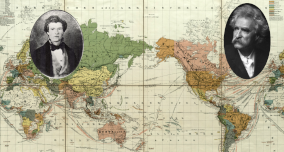For most of its 1,200 year history, Bremen was an independent city within the confederal jurisdiction of Germany's Holy Roman Empire. Its governing merchants and guilds were at the centre of the Hanseatic League that sought to monopolise the North Sea and Baltic Sea trade. To enlarge and confirm its independence, the city had, until the Reformation, to contend with the temporal power of the Church, and after the Thirty Years War with Sweden, the masters of the surrounding Duchy of Bremen-Verden.
In the late nineteenth century, Bremen was drawn by Prussia into the German Empire. With its new sea anchorage and wharves at Bremerhaven, it was the principal port of embarkation for German and central European emigrants to the Americas, and an entrepôt for Germany's late developing colonial trade. The Norddeutscher Lloyd (NDL), founded in Bremen in 1857, became one of the world's leading shipping companies.
In the twentieth century, Bremen, a broadly liberal and social-democratic city, lost its autonomy under the Hitler regime. After World War Two, in which almost two thirds of the city's fabric was destroyed, this was restored. Bremen became one of the founding Bundesländer (or states) of the German Federal Republic.
